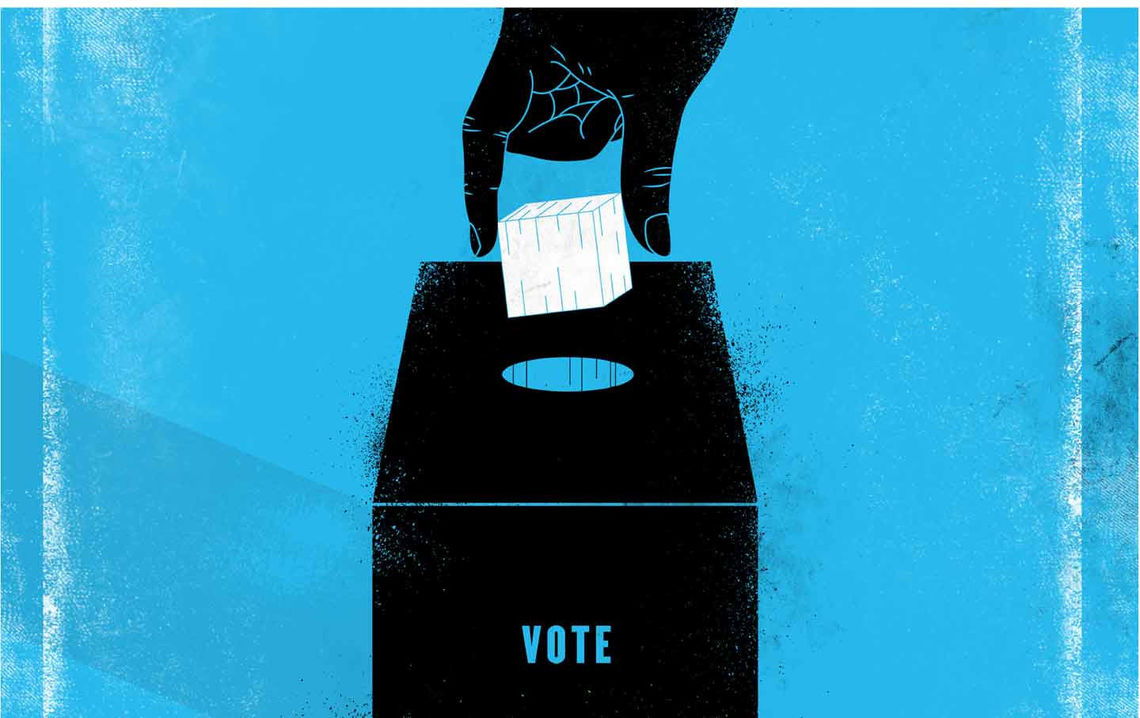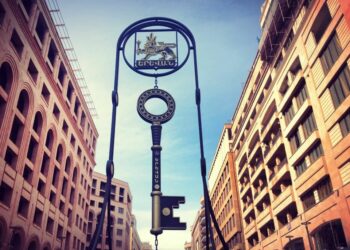
Illustration by Karl Raphael Blanchard.
A stark contrast from the 2013 election in the capital city where seven political parties participated in a 53% turnout election — only three chose to vie for seats on the council this year with turnout at a low of 41%.In addition to the Republican Party of Armenia garnering 71%, the opposition Yelq Bloc earned 21%, while the newly formed Yerkir Tisrani party managed to secure 8% of the vote.
Marred by controversy and accusations of voter fraud, the Yerevan City elections, held on Sunday, May 14, produced more questions than answers as the ruling Republican Party of Armenia claimed a decisive victory with over 70 percent of the vote.
A stark contrast from the 2013 election in the capital city where seven political parties participated in a 53 percent turnout election — only three chose to vie for seats on the council this year with turnout at a low of 41 percent. In addition to the Republican Party of Armenia garnering 71 percent, the opposition Yelq Bloc earned 21 percent while the newly formed Yerkir Tisrani party managed to secure 8 percent of the vote.
The low turnout was felt throughout the city as EVN Report correspondents visited various polling stations where poll workers noted the visible decrease in participation. An onslaught of afternoon thunderstorms helped usher in the final hours of voting, possibly driving turnout even lower.
Did the lack of political parties choosing to run in this year’s election have an impact on the turnout by the city’s electorate?
Counterintuitive to the notion that limited choices provide a clear contrast between political parties and ideologies, in Yerevan, where voter apathy and dispiritedness runs high, limited alternatives to the ruling party may have actually resulted in voters opting to stay home.
How much of a factor was election fatigue given voters in Yerevan, where over a third of the country’s population resides, voted in parliamentary elections just over a month ago? And is it possible that those who supported the opposition parties in the parliamentary election were not satisfied with the results and abstained from voting because of the belief that their vote would “not make a difference?”
Apathy was not alone on Election Day. The day did not go without controversy as both a reporter and candidate encountered violence. Police forcibly removed Zaruhi Postanjyan, the mayoral candidate for Yerkir Tsirani, from a Republican Party campaign office where she claimed there was evidence of vote buying.
Earlier in the day, an Azatutyun.am reporter was assaulted in a Republican Party campaign office after attempting to question staff members about witnessing residents walk out with money.
Just a week prior to Election Day, the opposition Yelq bloc with its candidate for Mayor, Nikol Pashinyan (Member of Parliament), released documents found in a dumpster behind a Republican Party campaign office outlining plans and procedures for buying votes through bribes, which even included a script on how to approach voters.
Although no hard evidence was produced, both Yelq and Yerkir Tisrani accused the Republican Party of pre-filling ballots. The strongest piece of evidence to this claim was the appearance of green and red ink pens used only on ballots marked for the Republican Party, as witnessed by observers throughout the city when ballots were counted.
Observers and political party proxies played a crucial role in ensuring the votes counted in each polling place get certified as the official numbers reported by the election commission. Their presence also helps limit the occurrences of ballot stuffing and voter intimidation. The free and fairness of the election process in Armenia is often compromised outside of the polling station, as witnessed during this year’s election cycle, through bribes, intimidating get out the vote efforts and even claims of pre-filled ballots.
The Republican Party’s success in the city elections tethered between vote buying, an effective organizational structure to execute such a strategy and an electorate of dispirited voters who either refused to participate or took bribes to do so.
Election fraud needs to be stopped and prevented but equally necessary in changing the electoral process in Yerevan and Armenia as a whole is the need to study and understand the behaviors and motivations of the electorate and how to effectively change the culture of voting.
Is every election in this country a foregone conclusion? From the outside that answer may seem like an overwhelming “yes.” But the reality of the intricate election system and culture makes that question difficult to answer. If voters refused bribes, if every polling station had an observer, and opposition parties presented substantive platforms, would more voters participate? Could an opposition party win a majority?
If a foregone conclusion, is it the result of effective election fraud or the result of an electorate feeding the cycle and a diaspora unwilling to participate to ensure fair elections?
The price of a dispirited voter in this election was around 10,000 – 15,000 AMD, roughly between $20 -$30 US.
The next major election in Armenia will be in five years when a new parliament and effectively new prime minister will be chosen. Until then, small cities throughout the country will hold local elections. We will wait to see how many opposition parties participate in these local municipal elections and if the same efforts will be employed by the ruling party, opposition and observers.
Related on EVN
Yerevan City Elections: Everything You Need to Know
Yerevan City elections will be held on May 14, 2017. Approximately 35 percent of the country's electorate resides in the capital city. EVN Report presents an overview of the three political forces taking part in this election.
Read moreThe Unbearable Lightness of Armenia’s Parliamentary Elections
The Republican Party of Armenia’s victory following parliamentary elections has left a bad aftertaste for many in the country. How was it that the RPA, despite its perceived unpopularity was able to secure a majority in parliament? Sos Avetisyan tries to look beyond the surface of political realities and into the heart of state-citizen relations.
Read moreArmenia’s Elections: A Straightforward Guide
With his specific brand of humor and wit, Narek Margaryan analyzes the April 2 parliamentary elections, putting into perspective the votes that each political party and bloc received from the electorate.
Read more



